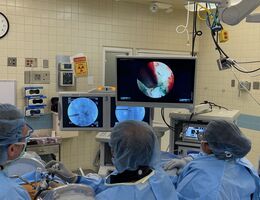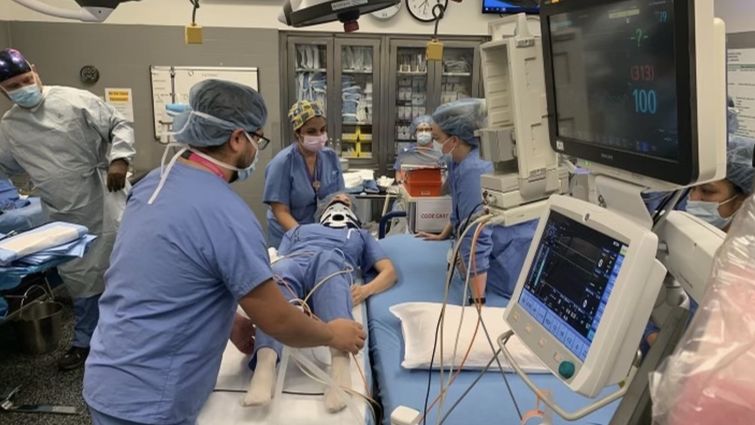

Operating room staff treat patient in mock trauma drill
When a pediatric patient suffering a traumatic brain injury is rushed to the emergency department, time is of the essence. Doctors, nurses, and operating room staff need to be ready at a moment’s notice to stabilize and treat critically ill trauma patients.
Loma Linda University Children’s Hospital (LLUCH) hosts mock trauma drills throughout the year with real-life scenarios designed to give hospital staff the necessary knowledge and skills to prepare for all kinds of emergencies.
Three scenarios run simultaneously during the training. Tanya Minasian, DO, FACS, directs the neurosurgery component, alongside Andrei Radulescu, MD, PhD, who oversees the general trauma component.
During the drills, the operating room staff is alerted that a trauma patient has arrived at the Emergency Department. The surgeon confirms that operative intervention is required, and the trauma room is set up. The patient is then brought to the operating room, placed under anesthesia, positioned, and surgery begins, says Minasian, a pediatric neurosurgeon who has been running the mock drills since its inception in 2019.
“Similar to real life, there can be various challenges that need to be addressed during the surgery.”
Whether it’s treating a “patient” involved in a severe car crash or a hard fall, these one-of-a-kind training scenarios keep new and experienced staff sharp for any trauma case.
“The staff has often said that the mock drills might be even more stressful than real life, just because we throw in a lot,” Minasian said. “Anything that could go wrong does go wrong in the mock drill, and that’s done on purpose.”
At the end of the two-hour drill, the teams gather to debrief and discuss strengths and weaknesses. The drills always help with certain process improvements that are put into place immediately.
Patients treated at LLUCH are more severely injured, with higher rates of surgery performed for severe traumatic brain injury patients compared to other children’s hospitals nationwide. In 2022, LLUCH treated more than 250 patients with head injuries, of which nearly 20% required surgery.
“As the only Level 1 pediatric trauma center in the region, we manage a high volume of critically ill trauma patients,” said Minasian. “Everybody who works in this hospital understands our mission. We treat each patient as if it’s our own child or family member. The mock trauma drills directly link to improving patient outcomes and saving lives.”
Common causes of traumatic injuries in children include falls, car crashes or other forms of transport, abuse, sports injury, and firearm-related injuries.
To learn more about neurosurgery at Loma Linda University Health, click here.


